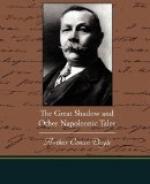“Wake up, laddie,” said the Major, quite in his old easy fashion, as if we were back on Corriemuir again.
“Yes, Major?” I stammered.
“I want you to come with me. I feel that I owe something to you two lads, for it was I that took you from your homes. Jim Horscroft is missing.”
I gave a start at that, for what with the rush and the hunger and the weariness I had never given a thought to my friend since the time that he had rushed at the French Guards with the whole regiment at his heels.
“I am going out now to take a tally of our losses,” said the Major; “and if you cared to come with me, I should be very glad to have you.”
So off we set, the Major, the two sergeants, and I; and oh! but it was a dreadful, dreadful sight!—so much so, that even now, after so many years, I had rather say as little of it as possible. It was bad to see in the heat of fight; but now in the cold morning, with no cheer or drum-tap or bugle blare, all the glory had gone out of it, and it was just one huge butcher’s shop, where poor devils had been ripped and burst and smashed, as though we had tried to make a mock of God’s image. There on the ground one could read every stage of yesterday’s fight—the dead footmen that lay in squares and the fringe of dead horsemen that had charged them, and above on the slope the dead gunners, who lay round their broken piece. The Guards’ column had left a streak right up the field like the trail of a snail, and at the head of it the blue coats were lying heaped upon the red ones where that fierce tug had been before they took their backward step.
And the very first thing that I saw when I got there was Jim himself. He was lying on the broad of his back, his face turned up towards the sky, and all the passion and the trouble seemed to have passed clean away from him, so that he looked just like the old Jim as I had seen him in his cot a hundred times when we were schoolmates together. I had given a cry of grief at the sight of him; but when I came to look upon his face, and to see how much happier he looked in death than I could ever have hoped to see him in life, it was hard to mourn for him. Two French bayonets had passed through his chest, and he had died in an instant, and without pain, if one could believe the smile upon his lips.
The Major and I were raising his head in the hope that some flutter of life might remain, when I heard a well-remembered voice at my side, and there was de Lissac leaning upon his elbow among a litter of dead guardsmen. He had a great blue coat muffled round him, and the hat with the high red plume was lying on the ground beside him. He was very pale, and had dark blotches under his eyes, but otherwise he was as he had ever been, with the keen, hungry nose, the wiry moustache, and the close-cropped head thinning away to baldness upon the top. His eyelids had always drooped, but now one could hardly see the glint of his eyes from beneath them.




